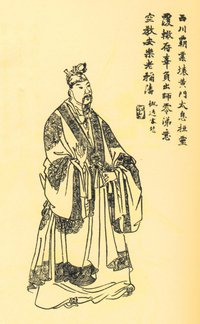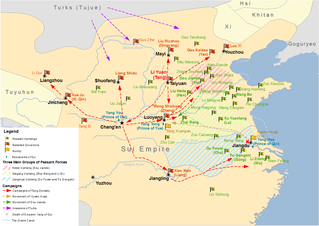
Year 908 (CMVIII) was a leap year starting on Friday of the Julian calendar.

Zhuge Liang, courtesy name Kǒngmíng was a Chinese statesman and military strategist. He was chancellor and later regent of the state of Shu Han during the Three Kingdoms period. He is recognised as the most accomplished strategist of his era, and has been compared to Sun Tzu, the author of The Art of War. His reputation as an intelligent and learned scholar grew even while he was living in relative seclusion, earning him the nickname "Wolong" or "Fulong", meaning "Crouching Dragon" or "Sleeping Dragon". Zhuge Liang is often depicted wearing a Taoist robe and holding a hand fan made of crane feathers.

Zhang is the third most common surname in China and Taiwan, and it is one of the most common surnames in the world. Zhang is the pinyin romanization of the very common Chinese surname written 张 in simplified characters and 張 in traditional characters. It is spoken in the first tone: Zhāng. It is a surname that exists in many languages and cultures, corresponding to the surname 'Archer' in English for example. In the Wade-Giles system of romanization, it is romanized as "Chang", which is commonly used in Taiwan; "Cheung" is commonly used in Hong Kong as romanization.

Liu Shan (207–271), courtesy name Gongsi, was the second and last emperor of the state of Shu Han during the Three Kingdoms period. As he ascended the throne at the age of 16, Liu Shan was entrusted to the care of the Chancellor Zhuge Liang and Imperial Secretariat Li Yan. His reign of 40 years was the longest of all emperors in the Three Kingdoms era. During Liu Shan's reign, many campaigns were led against the rival state of Cao Wei, primarily by Zhuge Liang and his successor Jiang Wei, but to little avail, due to their drastic mismatch in terms of population and size of reigned area. Liu Shan eventually surrendered to Wei in 263 after Deng Ai led a surprise attack on the Shu capital Chengdu. He was quickly relocated to Luoyang, capital of Wei, and enfeoffed as "Duke Anle". There he enjoyed his last years peacefully before dying, most probably of natural causes, in 271.
Sun is a transliteration of a common Chinese surname. It is the third name listed in the Song dynasty classic text Hundred Family Surnames.
Emperor Ai of Tang, also known as Emperor Zhaoxuan of Tang (唐昭宣帝), born Li Zuo, later known as Li Chu, was the last emperor of the Tang dynasty of China. He reigned—as but a puppet ruler—from 904 to 907. Emperor Ai was the son of Emperor Zhaozong. He was murdered by Zhu Wen.
Hao Zhao, courtesy name Bodao, was a military general of the state of Cao Wei during the Three Kingdoms period of China. He is best known for his victory at the siege of Chencang in 229 when he led a successful defence of Chencang against an invasion by a much larger army from Wei's rival state Shu Han. However, he died of illness not long after that.

Fei Yao was a military general of the state of Cao Wei during the Three Kingdoms period of China.

Romance of the Three Kingdoms is a Chinese television series adapted from the classical 14th century novel of the same title by Luo Guanzhong. The series was produced by China Central Television (CCTV) and was first aired on the network in 1994. It spanned a total of 84 episodes, each approximately 45 minutes long. One of the most expensive television series produced at the time, the project was completed over four years and involved over 400,000 cast and crew members, including divisions of the People's Liberation Army from the Beijing, Nanjing and Chengdu military regions. Some of the dialogues spoken by characters were adapted directly from the novel. Extensive battle scenes, such as the battles of Guandu, Red Cliffs and Xiaoting, were also live-acted.
Empress Xiao, formally Empress Min, was an empress of the Chinese Sui Dynasty. Her husband was Emperor Yang of Sui.
Xue Ju (薛舉), formally Emperor Wu, was the founding emperor of a short-lived state of Qin at the end of the Chinese Sui Dynasty, whose state was eventually destroyed by the Tang Dynasty. He rose against Sui rule in 617 and soon controlled modern eastern Gansu, but while he had some successes against Tang forces, was not able to push toward the Tang capital Chang'an before dying of illness in 618. His son Xue Rengao inherited his throne but was soon defeated and killed by the Tang general Li Shimin, ending the state that Xue Ju established.
Yuwen Huaji was a Chinese military general, monarch, and politician of the Sui Dynasty who, in 618, led a coup against and murdered Emperor Yang of Sui. He subsequently declared Emperor Yang's nephew Yang Hao emperor and led Emperor Yang's elite Xiaoguo Army (驍果) north. However, he was then repeatedly defeated by Li Mi, Li Shentong (李神通), and finally Dou Jiande. Believing that his defeat was near and wanting to become emperor before his ultimate defeat, he poisoned Yang Hao and declared himself the emperor of a Xu state. Dou captured him in 619 and killed him.

The transition from Sui to Tang (613–628) was the period of Chinese history between the end of the Sui dynasty and the start of the Tang dynasty. The Sui dynasty's territories were carved into a handful of short-lived states by its officials, generals, and agrarian rebel leaders. A process of elimination and annexation followed that ultimately culminated in the consolidation of the Tang dynasty by the former Sui general Li Yuan. Near the end of the Sui, Li Yuan installed the puppet child emperor Yang You. Li later executed Yang and proclaimed himself emperor of the new Tang dynasty.

Three Kingdoms is a 2010 Chinese television series based on the events in the late Eastern Han dynasty and the Three Kingdoms period. The plot is adapted from the 14th century historical novel Romance of the Three Kingdoms and other stories about the Three Kingdoms period. Directed by Gao Xixi, the series had a budget of over 160 million RMB and took five years of pre-production work. Shooting of the series commenced in October 2008, and it was released in China in May 2010.

Lady Maid Maid is a Taiwanese idol romance drama television series created and developed by SETTV. It stars Nicholas Teo, Reen Yu, Janel Tsai, Danny Liang and Katherine Wang as the main cast for the drama series. The drama debuted on 27 November 2012, replacing Sweet Sweet Bodyguard's time slot on SETTV's 8PM Drama line up. The drama started filming on 25 October 2012.
Li Hao (李昊) (891?/893?‒965?), courtesy name Qiongzuo (穹佐), was an official for the Chinese Five Dynasties and Ten Kingdoms Period states Former Shu, Later Tang, and Later Shu, serving as a chancellor during the reign of Later Shu's last emperor Meng Chang.

The Wonderful Wedding is a 2015 Taiwanese comedy film starring Chu Ke-liang, Ruby Lin, Li Dongxue, Kou Hsi-shun and Lin Mei-hsiu. A meet-the-parents-of-fiancée comedy, it pokes fun at the cultural and linguistic differences between Kaohsiung in southern Taiwan and Beijing in northern China.

Xu is a Chinese-language surname. In the Wade-Giles system of romanization, it is romanized as "Hsu", which is commonly used in Taiwan. It is different from Xu, which is represented by a different character.










